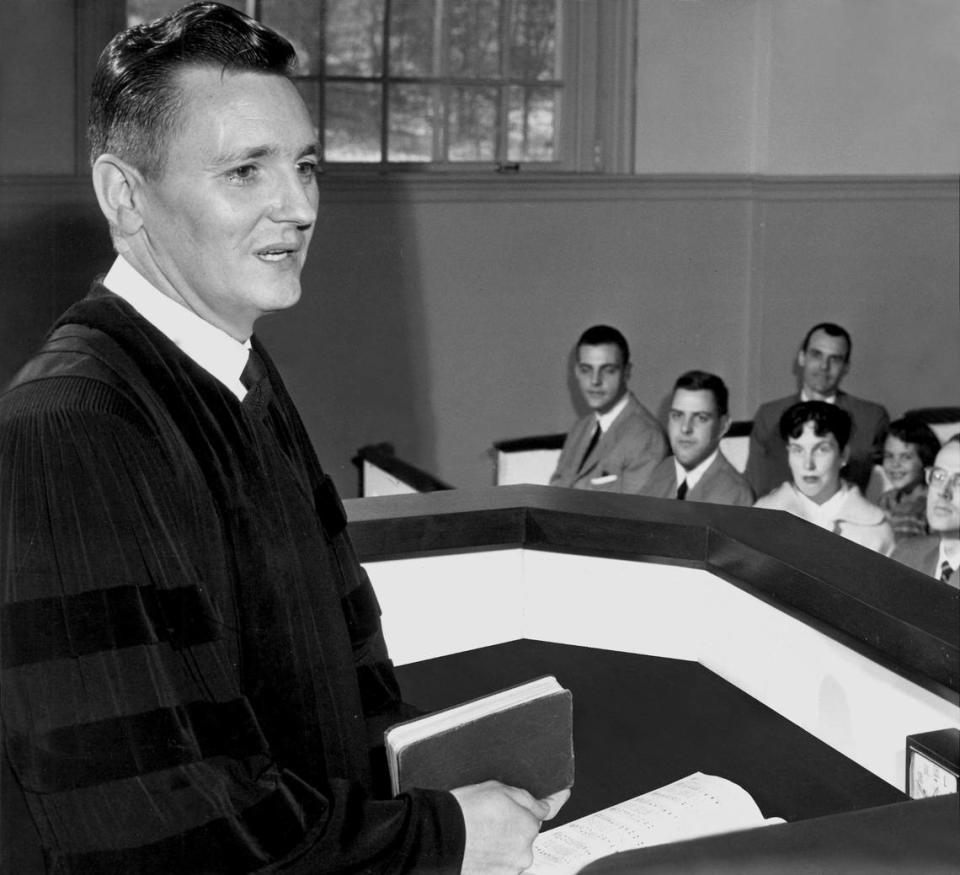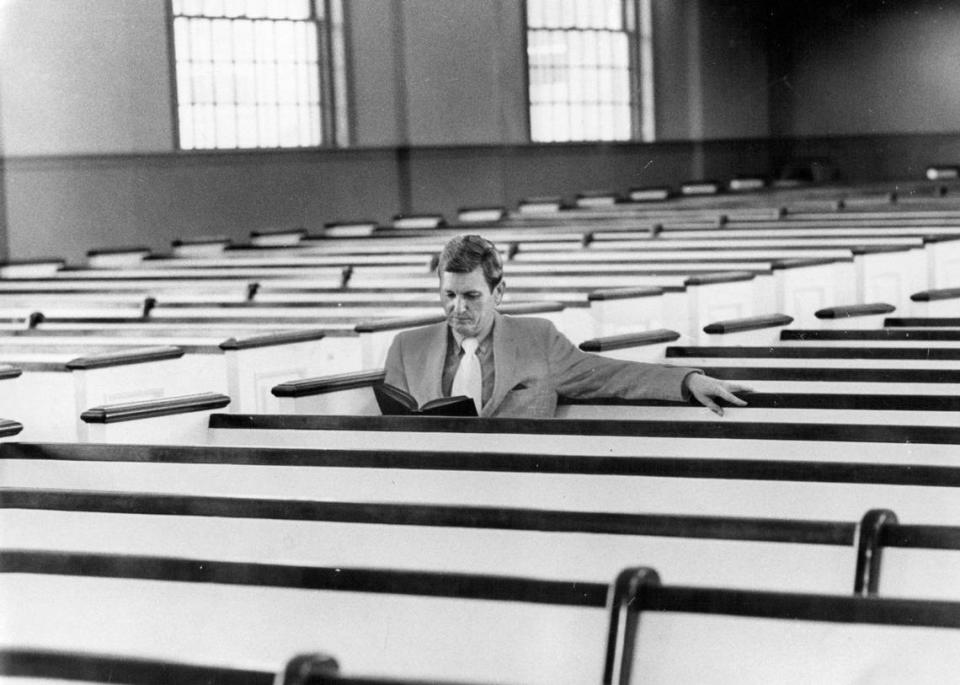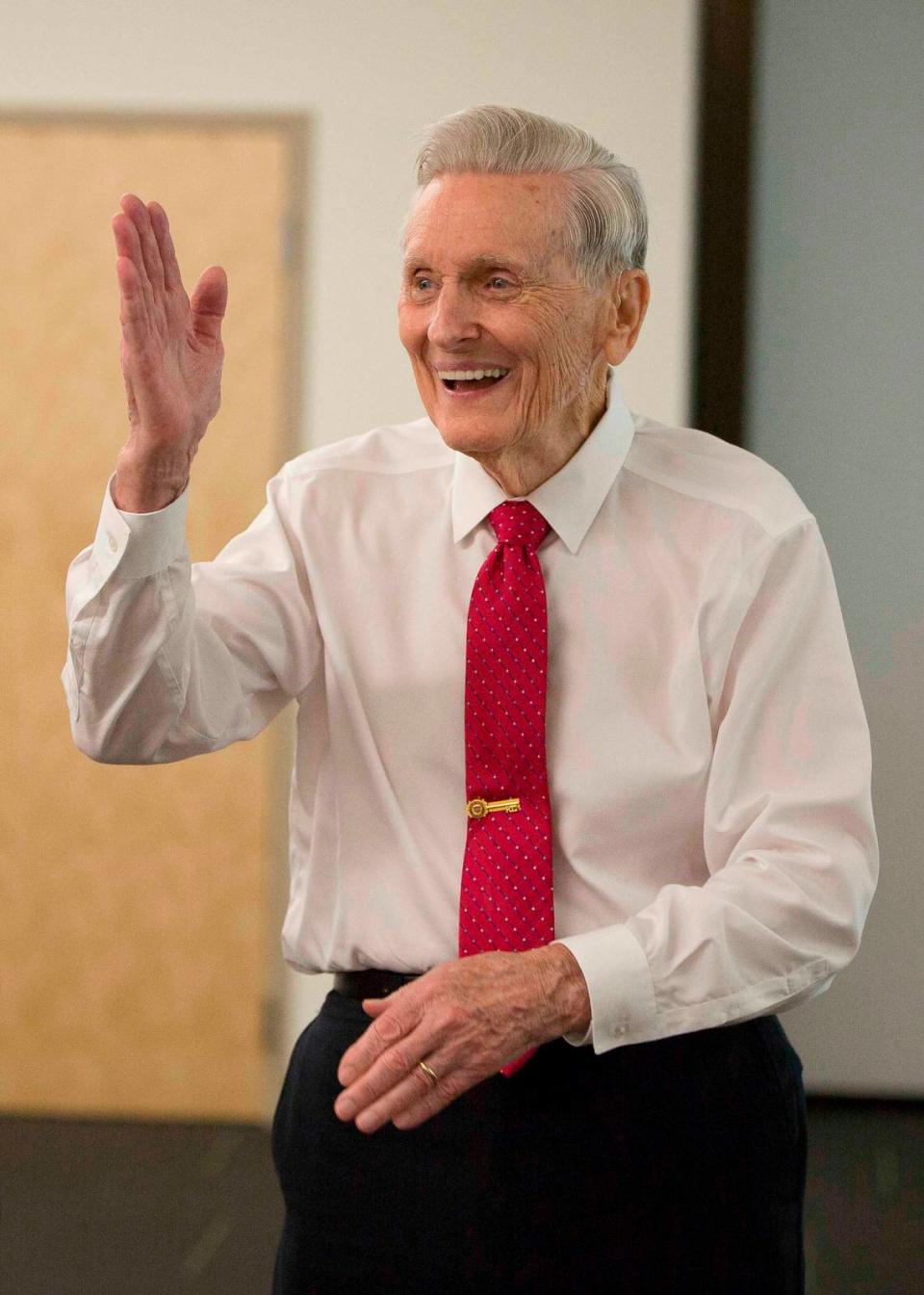Bob Meneilly, ‘courageous’ Johnson County pastor who took on racism, extremism, dies
The Rev. Robert H. Meneilly, who grew a small, yet emerging Johnson County church into one of the largest Presbyterian congregations in the country, becoming a powerful and progressive voice from the pulpit, died on Tuesday. He was 96.
Meneilly led the Village Presbyterian Church in Prairie Village for 47 years until his retirement in 1994. Over the years, Meneilly played a major role in the civic and social fabric in the Kansas City area, especially Johnson County.
“Rev. Robert Meneilly was known for his kind heart, his powerful sermons, and his strong belief in the power of fellowship and community,” Kansas Gov. Laura Kelly said in an email to The Star. “Throughout his life, he publicly tackled the most challenging issues of the moment — racism, sexual orientation, war, social justice — because he believed in our collective responsibility to stay connected to each other as human beings, regardless of our differences.”
The church, at 67th Street and Mission Road, grew from 282 members at its inception to more than 7,700 at the time Meneilly retired.
The congregation also has a campus at 148th Street and Antioch Road in Overland Park. The Meneilly Center for Mission, at 99th Street and Mission Road, supports the church’s mission work and houses a food pantry, a day care and a computer center.
Fresh out of seminary in 1947, Meneilly built the church by walking door to door, inviting residents to worship with the fledgling congregation, said the current senior pastor, Tom Are Jr. The church was officially founded in February 1949.
“He was tireless as a pastor and he was courageous in matters of social justice,” Are said. “He had an unending commitment to make Johnson County the most kindest, the most faithful and most just place to live.”

Through his sermons, Meneilly never shied away from controversy, speaking out against the crippling effects of injustice.
In 1965 and 1966, Meneilly delivered several sermons encouraging white Johnson County suburbanites to welcome Black neighbors.
In the late 1960s, at Meneilly’s urging, the church created the Black Motivation Training Center, which helped the poor find employment and remained in existence for more than a decade.
By the 1970s, Meneilly became a vocal critic against the Vietnam War.
“Dr. Bob — as he was affectionately called — did not build the Village Presbyterian Church into a local and National Christian juggernaut; he built the people who, in turn, built the church,” U.S. Rep. Emanuel Cleaver II, himself a pastor, said in an email to The Star.
“When I came along as a young preacher, Bob Meneilly was the ‘preacher’s preacher.’ All of us younger preachers were awestruck by his audacity and his always brotherly persona.”

On Aug. 15, 1993, Meneilly propelled himself onto the national political stage with his sermon “The Dangers of Religion,” denouncing the “stealth” campaign tactics of the “religious right.”
“Religious extremists are breeding all kinds of ‘culture wars.’ Religion can breed all kinds of harassment, bigotry, prejudice, intolerance and deception,” he stated, adding that religion “can be a democratic republic’s greatest good or its worst threat.”
In an interview with The Star later, Meneilly said, “I have always believed in the preservation of the separation between church and state. My main point was that our constitutional liberties are not anti-religious. Sometimes the religious right claims they are.”
A condensed version was reprinted in The New York Times and other publications nationally.
Following that sermon, Meneilly and five other Johnson County civic leaders formed the Mainstream Coalition, a nonprofit, a bipartisan group tasked with guarding against ideological extremism and protecting the separation of church and state.
“We are saddened by the passing of our dear friend Dr. Robert H. Meneilly,” said Michael Poppa, the group’s executive director. “We will honor his memory by dedicating ourselves to the work he championed: respect for the rights, beliefs, and freedoms of all individuals. Through our continued efforts, his legacy will live on for generations to come.”

Meneilly was born on March 5, 1925, in Mount Lebanon, Pennsylvania, and began preaching when he was about 13. He earned a master’s of divinity degree from Pittsburgh Theological Seminary.
Meneilly married Shirley Ann Dunlap in 1947. After college, he and his wife traveled to China for missionary work but were stopped when the Communist government closed the country’s borders to outsiders.
The couple had three children.
“Bob Meneilly was absolutely fearless in the pulpit,” said Bill Tammeus, a former columnist for The Star who currently writes on religious and ethics for various publications. “He knew that his job was to give the congregation a word from God, and he was always well prepared because he studied Scripture carefully and he paid attention to events in the news.
“So, although he was never arrogant about his task, he was nothing but confident in his sermons. Beyond that, he practiced what he preached.”

In retirement, Meneilly remained active in civic affairs, including serving on various boards. Among them: Johnson County Community Services, Kansas City Planned Parenthood, Metropolitan Lutheran Ministries, Ozanam Home for Boys, Kansas City Mayor’s Commission on AIDS, Midwest Christian Counseling Center, and the Southern Christian Leadership Conference of Greater Kansas City.
“His vision really changed the vision of our county,” said Johnson County Commissioner Becky Fast. “He created a welcoming community. …
“The culture he created in the Village … its DNA spread across northeast Johnson County, into their government and community groups. He created a community for all, a caring, collective community.”

